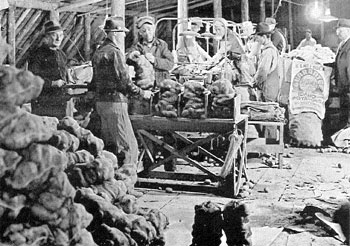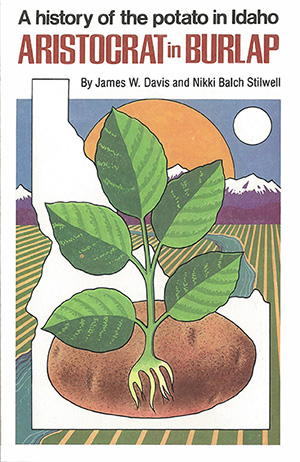 One of the early innovative Idaho shippers was Bill Bailey.
One of the early innovative Idaho shippers was Bill Bailey.
At the same time, preference for Idaho® potatoes in the foodservice field was growing and restaurant operators proved to be quite willing to pay a higher price to get carefully sized and selected potatoes. Not only were Idaho shippers purchasing equipment for packing five- and ten-pound consumer bags, they were buying sizing machines that enabled them to pack a closely sized 50-pound carton, which proved to be the most convenient unit for the restaurant operator, a unit which could also be sold to the supermarket for bulk displays of premium-quality bakers. Shippers who refused to keep up with the new merchandising and marketing methods found it increasingly difficult to compete, and signs were beginning to appear that the Idaho® potato-shipping industry was due for some drastic changes.
The '70s and '80s saw many of the old-time shippers retire to be replaced by a cadre of young, forward-looking people. Many old facilities were abandoned for new, modernized plants with greater capacity and improved efficiency. Potato processors were adding fresh shipping departments that were state-of-the-art. However, exclusively fresh warehouses being built, like Bonded Produce, Inc., and Circle Valley Produce, Inc., both in Idaho Falls, were also large-capacity operations with no expense spared in equipment and design.
The demand for cartons and consumer bags of sized potatoes created new problems for shippers. It meant enlargement and remodeling of shipping warehouses and investments in expensive mechanical and electronic-sizing equipment. Those operators who had a number of small warehouses simply could not afford to update all of them, and there was only enough room in the industry for a limited number of large volume shippers.
With all of its virtues of flavor, texture, and keeping qualities, the Russet Burbank variety is difficult to grow and consistently produces a high percentage of U. S. number one tubers. The expanding processing industry in Idaho was utilizing the processor grade (misshapen, undersized, and overly large potatoes) that the shippers could not pack, so economics demanded that surviving fresh shippers have a plant within hauling distance to sell that portion of the field-run crop.
Water-quality standards became more stringent during this period, which meant that the water used in a shipping warehouse to wash potatoes and to transport them in flumes could no longer be dumped in the nearest drain ditch, river, or creek without treatment. This factor added another increment of expense that spelled the end of the small shipping shed.


 One of the early innovative Idaho shippers was Bill Bailey.
One of the early innovative Idaho shippers was Bill Bailey.